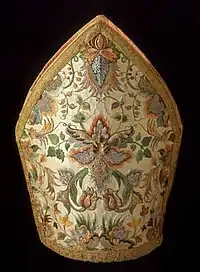Bishop
Bishop is a type of clergy in some Christian churches. The bishop is the leader of the Christians and the Christian priests in each diocese. The diocese which a bishop governs is called a bishopric. Episcopal is the adjective for bishops. A cathedral is the church building where the bishop has an episcopal throne. The cathedral is the main church of the diocese and the bishop's see. A bishop may be given the rank of archbishop in an archdiocese.[1]


Christian priests in some denominations must be made priests by bishops. In these denominations, bishops are above parish priests in the hierarchy of the church's organization. However, some Protestant denominations have no bishops or archbishops. The Presbyterianism is an example.[2] The leader of the Church of Scotland is the Moderator. The General Assembly elects the Moderator of the Church of Scotland each year.[3] Other Christian movements have neither bishops nor priests: Quakers are one example.
In the Catholic church, the Pope is chosen by all the cardinals from amongst their number.[4] According to church law, this does not have to be the case: any male, unmarried, baptized Christian who is judged fit for the office can become pope. However, the last pope who was not a bishop was Urban VI (elected in 1378).
The pope is also 'the Bishop of Rome'. In fact he rules an independent state within Rome, called the Vatican. All Roman Catholic bishops answer to the pope (or to patriarchs in some orthodox churches). In the Anglican church, bishops are governed by Archbishops.
Usually a bishop can be identified by a special hat, called a mitre.
References
- "Bishops". Catholic-Pages.com. Archived from the original on 26 April 2015. Retrieved 18 June 2015.
- "Question and Answer OPC Church Government". The Orthodox Presbyterian Church. Retrieved 18 June 2015.
- "The Moderator". The Church of Scotland. Retrieved 18 June 2015.
- "How Is A New Pope Chosen?". United States Conference of Catholic Bishops. Retrieved 18 June 2015.
Other websites
- Bishop Citizendium